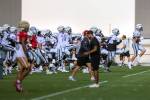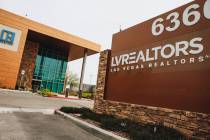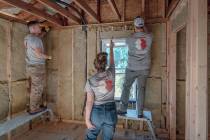Communities suffer when banks don’t pay HOA fees
On June 28 the past president of the Greater Las Vegas Association of Realtors, Keith Lynam, talked to the Las Vegas Review-Journal about homeowners associations’ foreclosing on homes. The headline read: “Realtor groups say HOA foreclosures unfair.”
I was greatly disappointed in many of his comments, which I consider “fear tactics” as opposed to being factual statements. For the record, I was the 1996 president of the Greater Las Vegas Association of Realtors.
Mr. Lynam criticized Nevada HOAs’ ability to use their superpriority lien position to extinguish mortgage lenders’ financial positions in HOA foreclosures.
There is no reason for a lending institution to lose its loans on any homes if they follow the procedures as noted in the Nevada Revised Statutes 116.3116 subsection 2c., which require them to cure the homeowner’s default in paying the HOA costs, not to exceed nine months of assessments.
In a number of Nevada Federal District Court cases, the lending institutions have been chastised by the courts for not taking the legal steps to protect their loans. In fact, in its decision, the Nevada Supreme Court noted the banks receive adequate notices and warnings through the Notice of Default and Notice of Trustee Sale, which are required to be sent to the bank before a foreclosure sale can proceed. An association cannot just wave a magic wand and take possession of a home.
In 2013, the Legislature passed a bill (Senate Bill 280) that would allow lenders to impound association fees, similar to current lender practices of impounding property taxes and insurance expenses, NRS 116.3116 (3). Unfortunately, the majority of banks did not take advantage of this new law.
During the 2015 legislative session, a proposed law would have required lending institutions to impound association assessments failed.
For years, homeowner associations have felt the brunt of the inactivity of the banks on foreclosures. A hefty financial burden hits communities when banks refuse to pay fees on foreclosed homes. In addition, communities suffer when banks don’t keep homes in good physical condition.
Right now, there are still hundreds of abandoned homes, which have delinquent bank loans, where the associations are not receiving any assessments and where the banks have yet to take any foreclosure actions.
Often associations are financially unable to initiate foreclosures on their delinquent homes for nonpayment of assessments. Many of the homes were upside down (loans being substantially greater than the current market value). In these cases, associations were unable to sell the homes at foreclosure auctions. This left communities paying the collection costs as well as assuming homeownership and incurring new expenses, such as property taxes, maintenance and insurance. In addition, HOAs are often afraid to foreclose on a home in this uncertain legal atmosphere and they are unsure if they can get a clean title.
Lynam also said associations were “…being very aggressive the past couple of years in foreclosing on homes…”
Association boards have a fiduciary responsibility to its members. Should associations not take any foreclosure actions and let its delinquency rate increase to a point where the majority of homeowners have to absorb the operating loss through increased assessments and mid-year special assessments in order to pay their basic operating expenses?
Lynam further states “… in some cases, HOA management companies and their hired collection companies have entered agreements with investors to purchase the HOAs debt and proceed to foreclose on the homes for these investors.”
This is an inaccurate statement on many levels. Association board of directors make these decisions, not management companies or collection companies. Ask yourself a question, why would an association allow an investor to pay the delinquent homeowner’s debt? Simple answer: The association needed the operating funds because the lenders failed to either pay the nine months assessments or take action to foreclose on the homeowner.
In closing, there are a few facts that need to be made:
1) State law regulates the amount of interest an association can charge on delinquent assessments (NRS 116.3115 (3), a law that has been on the books since 2009.
2) Since 2009, state law authorized the Commission for Common-Interest Communities and Condominium Hotels to regulate collection costs, which have been capped. In 2015, the Legislature revised these.
3.) A 60-day redemption period was passed in the 2015 Legislature that allows the homeowner and any interested party to protect its security interest before an association can obtain a foreclosure deed.
I invite any GLVAR or Nevada Association of Realtors officers or legislative committee chairs to sit down and talk with me as they need to realize this position is very much a detriment to the average HOA-assessment-paying homeowner.
Homeowners, you will be hearing from your boards and management companies of the multitude of alternative dispute resolution, ADR, lawsuits banks have launched against associations. This will increase the cost of buying a home in an HOA community.
Right now, associations are contacting their insurance companies — deductibles can range from $1,000 to $7,500 per claim that will be paid out of your operating account, which was probably not budgeted for 2016.
It is hoped insurance companies continue to renew policies. Some already have indicated they will not insure associations that are being sued over the superiorlien and foreclosure actions. Insurance rates are bound to increase even more than they have over these past years.
It is way past time for the Nevada legislators to realize who is the victim here, and it is not the lending institutions who continue to be rewarded for their bad-faith actions.
Barbara Holland is a certified property manager, broker and supervisory certified association manager. Questions may be sent to holland744o@gmail.com.


















